Fishing the Kisaralik, Conclusion
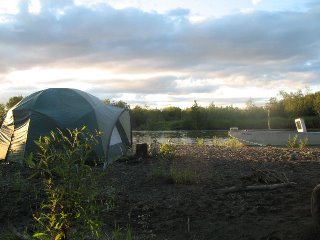
...continued from Part 2...
By nightfall, the sky was clouding up again. The brothers turned in early, and Henry, Dutch and I sat a while longer by the fire. The wind was picking up and Henry predicted more rain that night.
“We may want to think about leaving pretty early tomorrow,” he said, as he left for his tent.
Dutch and I sat watching the dying coals and thinking our own thoughts. Bear was a pile of fur next to Dutch’s feet, but Pepper was in alert mode, patrolling the camp perimeter. She did not seem alarmed, just paying attention. I wondered if she were picking up bear-scent.
We finished dinner clean-up and had the kitchen tent in order before turning in when a few fat drops of rain began to sizzle on the remains of the fire. With a whoop, Dutch grabbed my hand and we ran for the tent just as a burst of rain showered our camp. Both dogs were close behind and fully expected shelter from the storm in our tent that night. The shower was a brief one, and by the time we drifted to sleep it had stopped.
I awoke several times during the night, but heard no more rain falling. The dogs were in and out of the tent at will; with a wall tent, no human assistance is required. At some point just before dawn, Pepper woke me with a bark that had a mild alarm sound to it; nothing serious, she was not taking out after anything, or trying to climb in bed with me. But when I remembered it later, I recognized a level of anxiety in her sound that is not usually present.
Dad and Uncle Bob were the first ones up, and soon they were scratching on our tent flap, saying “You guys better get up, we may have a problem.” Pepper was continuing her anxious in-and-out behavior too, which told me something was wrong.
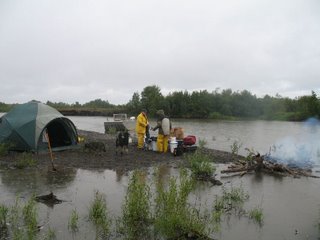
We dressed quickly and joined them in front of the tents. The river had risen overnight and was starting to reclaim our gravel bar. The situation was not yet alarming, but it could get that way. The sky remained very overcast and looked as though more rain could fall at any moment.
I went to get the coffee started while Dutch relayed the weather conditions to Henry, who was still in his tent. He appeared several minutes later, took a look at the river, and said “Holy crap, you guys! We may be in trouble here!”
He grabbed a long stick and stuck it in the gravel at the edge of the water as a marker to monitor the rising water level. The upper end of the gravel bar was gone, and water was approaching the campfire. Henry got it burning again to add some warmth to the damp
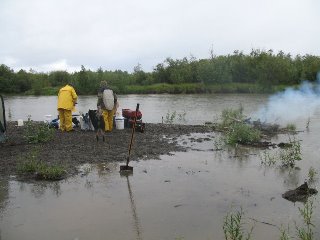 morning; he couldn’t stand letting the river reclaim the wood we’d worked so hard to gather.
morning; he couldn’t stand letting the river reclaim the wood we’d worked so hard to gather.It was clear we needed to break camp and pack the boats without wasting a lot of time, but there was no need for neck-breaking speed about it. A hot breakfast would fuel our efforts, so I attended to that while the guys worked on emptying tents and hauling gear to the boats. In the two hours it took us to get packed up, the water rose another foot or so.
The kitchen tent was actually on the bank, not on the gravel bar, and was getting cut off by an encroaching slough of water which began running between the bank and bar as the river rose. The dogs knew the shallowest crossing, and Uncle—ever the engineer—grabbed a shovel and began moving gravel to bridge up their crossing spot. It helped for a while, but the steady rise of the river eventually overcame his dirt works. We got the kitchen completely moved out shortly before the slough became deeper than our knee boots.
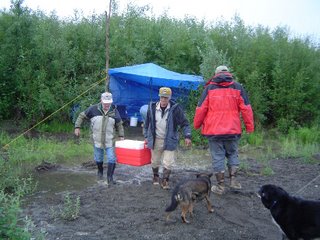
While we were eating breakfast, we talked about the phenomenon we were observing with the river. It was puzzling to me; we had had a huge deluge of rain two nights before and had not seen much change in the river. Last night we had only a small amount of rain, by comparison. This late in August there would not be a sudden melting of ice and snow in the mountains to increase the volume in the river, as can happen in the spring. So what is causing this flooding now? If it is from the rain, why didn’t it happen Friday morning?
“The answer,” said Henry “is the beavers. There are thousands of them all through these hills and streams. They have dams built on all the smaller tributaries to the rivers. For a day or two after a really heavy rain, all those dams will hold the water back from rushing into the river. But if rain continues, even without being heavy, eventually the dams will be overcome and all the water will be released at once into the river. That’s what happened last night, and we’re seeing the result of it this morning.”
His words inspired a great mental image of thousands of busy, furry little engineers building thousands of dams on the many streams feeding into the Kisaralik River. He said that, depending on the terrain, some of the dams could be four or five feet tall.
Uncle was immediately interested in beaver-work-crew organization. “Is there a main beaver boss who directs the construction?” he wondered.
“Usually there is a dominant male in each beaver colony who is in charge of construction,” Henry said. “He is the one who is patrolling the territory, looking for problems, while the younger worker beavers are out chewing down saplings and dragging them to the construction site.”
In my mental image, I could see the boss beaver doing inspections, and all the worker beavers wearing hard hats and carrying tiny chain saws. It made me smile.
The river continued rising while we packed the boats, and by the time we were ready to depart, there was not a lot of our gravel bar left. The campfire had succumbed to the river and was floating downstream. I was glad it had not started six hours earlier, or we’d have awakened in soggy beds.
We headed back for civilization with Dad and Uncle Bob driving my boat, and Dutch and me in Henry’s boat with him. We had one dog in each boat, but Bear was so loudly unhappy to be separated from his “pack” that we soon pulled the boats together and let him join us in Henry’s boat. He was all smiles after that.
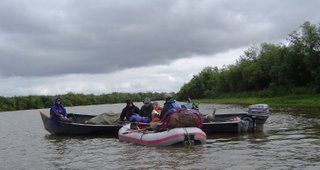
A half hour or so downriver from where we had camped, we saw the same two rafters we had passed two days earlier. Dutch and Henry had also passed them on their logging run (which I forgot to mention) and Henry had stated at dinner that night that the pair had looked pretty tired and ready to quit. Now, two days and more rain later, they looked even more so.
Henry pulled up next to them for a chat. They had started on the lake which gives birth to the Kisaralik way up in the mountains twelve days ago. In that time, they had had two days without rain. They had two more days to go before the appointed rendezvous time with their transportation back to Bethel, and they were a day ahead of their rowing schedule due to the high, fast current in the river. So they’d have to sit around at the meeting spot and just wait for the guy who was coming to get them. They looked pretty glum.
“I can take you back, if you want,” Henry said. “We can load your raft and gear right here in my boat and have you back in Bethel in about two hours.” The look on their faces was both surprise and gratitude.
“That would be great!” the guy said. “We’d be happy to pay you.”
“I don’t want money,” Henry responded. “I’m glad to help.”
So we transferred them and their gear into Henry’s boat, and then the guy and Dutch lifted the raft over our gunnel and set it on top of the gear. During the discussion, Dad had brought my boat along side and all three craft were floating together downstream while we talked. As their gear was transferred, I hopped over to my boat with the dogs, to make more room on Henry’s boat. Those were two very happy, water-logged rafters.
We made it home to Bethel without any further problems. Mounds of wet camping gear had to be sorted and dried, but that too was accomplished. We ate fresh salmon for dinner and put lots more in the freezer for Dad and Uncle Bob to take home with them. And we all appreciated a real bed to sleep in; ain’t none of us spring chickens any more!
Dad and Uncle stayed three more days, and we did more fishing as day trips out of Bethel. One trip was with Henry to do subsistence fishing with the drift net, which they were glad to have the opportunity to observe.
They left on Wednesday, taking with them a cooler full of salmon and a cram-packed week’s worth of fun and memories. Maybe a little rainier fun than they might have liked, but as Uncle said, “adventure without adversity is soon forgot; adventure with adversity is long remembered.” This was one adventure we will all long remember.
Labels: Tundra Life




6 Comments:
All your "characters" come across as fully formed, 3-d people. I love Henry's knowledge of his place. It is like listening to people tuned to the land, it capitvates one. and what a great momento for your family to be able to read all about it.
Sounds like you had a wonderful time and Henry sounds like a good man.. not many like him around anymore!!!
BB and wolfbaby--it was a great adventure, and Henry is a wonderful man. I am honored to know him, and to call him my friend. He has taught me so much about this amazing place. He is a big part of the reason that I love it here so much.
Thanks for hanging in through this saga! I hope it was fun to read about; it was certainly fun to do.
God has blessed me with a wonderful family, and many memorable experiences.
Uncle Bob
Once again so wonderful to hear such positive comments about this lovely area we live in. Your writing is lyrical and beautiful. Thank you so much. I look forward to more!
Uncle Bob--thanks for coming up to Alaska to share a slice of our life with Dutch and me. We loved having you here!
Dr. Hodges--thanks for reading, and for commenting. Glad you enjoy it!
Post a Comment
<< Home